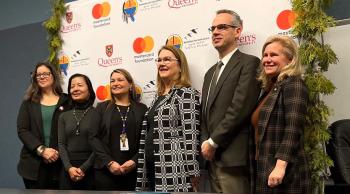Image Caption
Summary
Local Journalism Initiative Reporter
Windspeaker.com
A new approach to health delivery is expected to transform the healthcare service in northwestern Ontario.
This morning, Weeneebayko Area Health Authority (WAHA) and Queen’s University announced a partnership aimed at co-developing a unique healthcare program that will see Indigenous students educated as nurses, physicians, physiotherapists, occupational therapists, midwives, and paramedics at a training site to be established in Moosonee that will serve coastal community sites.
Funding in the amount of $31 million from the Mastercard Foundation will help make this happen.
“When students graduate from these health sciences programs, they will be ready to serve their communities and provide much needed access to health care,” said Jane Philpott, dean of Queen’s Health Sciences. Philpott is also a former federal health minister and former Indigenous Services minister with the Trudeau Liberal government.
The first cohort of students will not start until September 2025 as the curriculum is presently being co-developed. An ultimate enrollment of 240 students per year is anticipated.
Philpott described the program as providing “culturally informed, decolonized interdisciplinary curricula” to the new health professionals.
“It is an unprecedented approach to health sciences education and it will transform the way that health care is delivered to Indigenous peoples in the Weeneebayko area, along the western coast of James Bay and well beyond that,” said Philpott.
The curriculum will focus on interprofessional training, which will involve healthcare professionals training together in the preclinical environment, as well as in hospitals and clinics, said Dave Taylor, senior advisor, WAHA Partnership, Queen’s Health Sciences.
“So they graduate ready to serve together in their roles,” said Taylor. “Building a curriculum that is interprofessional like that is a complicated job. But it’s one that offers so much opportunity for success…and looking at the sustainability of health care in the region, I think that’s one of the key aspects.”
WAHA historically has had issues with retaining healthcare staff, said WAHA president and CEO Lynne Innes.
“I feel strongly that once we’re able to launch the program and build within the region that we’ll be able to fill many positions within our healthcare sector and other sectors to build capacity and sustainability,” said Innes.
She said that training within First Nation communities would bolster work force retention while graduating professionals who are capable of providing culturally appropriate care to their communities.
Bolstering retention and filling positions will also be critical in light of last month’s ground-breaking ceremony at Northern College’s Moosonee campus for a state-of-the-art healthcare complex that has been talked about for decades.
The new complex will include a 36-bed hospital, larger emergency room, modern surgical rooms, dental and pharmacy services, as well as a laboratory, diagnostic imaging and expanded mental health and addictions services. There will also be a 32-bed Elder lodge, a hostel for patients and residences for staff.
People in the region now are being served by the Weenabayko General Hospital in Moose Factory which was built 70 years ago. Due to its limited resources, patients with medical emergencies are often air-lifted south to hospitals in Timmins and Kingston.
When the new complex comes into full operation in 2027, the general hospital will be redeveloped into an ambulatory care centre.
“In our region we all know the healthcare challenges facing remote First Nations communities including low accessibility to providers, and facilities, a lack of cultural competence in care, health outcomes gaps, and underrepresentation of First Nations peoples among healthcare professions,” said Innes. “Our goal is to drive health transformation by improving regional health outcomes, addressing delivery gaps, and building Indigenous representation.”
The partnership between WAHA and Queens will also establish a Health Career Pathways Program to provide career counselling, resources, mentorship, and application support, as well as build access to prerequisite courses to support applications in health sciences.
Never miss a Windspeaker article. Subscribe Today to our new Windspeaker Newsletter!
Local Journalism Initiative Reporters are supported by a financial contribution made by the Government of Canada.

